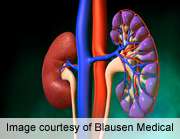Ringer's acetate better for patients with severe sepsis

(HealthDay) -- Fluid resuscitation with hydroxyethyl starch (HES) 130/0.4 for patients with severe sepsis leads to an increased risk of death at day 90 and an increased likelihood of requiring renal-replacement therapy, compared with Ringer's acetate, according to a study published online June 27 in the New England Journal of Medicine.
Anders Perner, M.D., Ph.D., from Rigshospitalet in Copenhagen, Denmark, and colleagues randomly assigned 798 participants with severe sepsis participating in a multicenter trial to fluid resuscitation in the intensive care unit with 6 percent HES 130/0.4 or Ringer's acetate (up to 33 mL per kilogram of ideal body weight per day).
The researchers found that, at 90 days following randomization, 201 of 398 patients assigned to HES 130/0.4 had died, compared to 172 of 400 patients assigned to Ringer's acetate (relative risk [RR], 1.17; 95 percent confidence interval [CI], 1.01 to 1.36), and one patient in each group had end-stage kidney failure. In the HES 130/0.4 group, 87 patients (22 percent) were treated with renal replacement therapy in the 90-day period, compared to 65 patients (16 percent) in the Ringer's acetate group (RR, 1.35; 95 percent CI, 1.01 to 1.80), and 38 and 25 patients, respectively, had severe bleeding (RR, 1.52; 95 percent CI, 0.94 to 2.48).
"Patients with severe sepsis assigned to fluid resuscitation with HES 130/0.4 had an increased risk of death at day 90 and were more likely to require renal-replacement therapy, as compared with those receiving Ringer's acetate," the authors write.
Perner disclosed receiving grant support from Fresenius Kabi.
More information:
Abstract
Full Text
Copyright © 2012 HealthDay. All rights reserved.
















